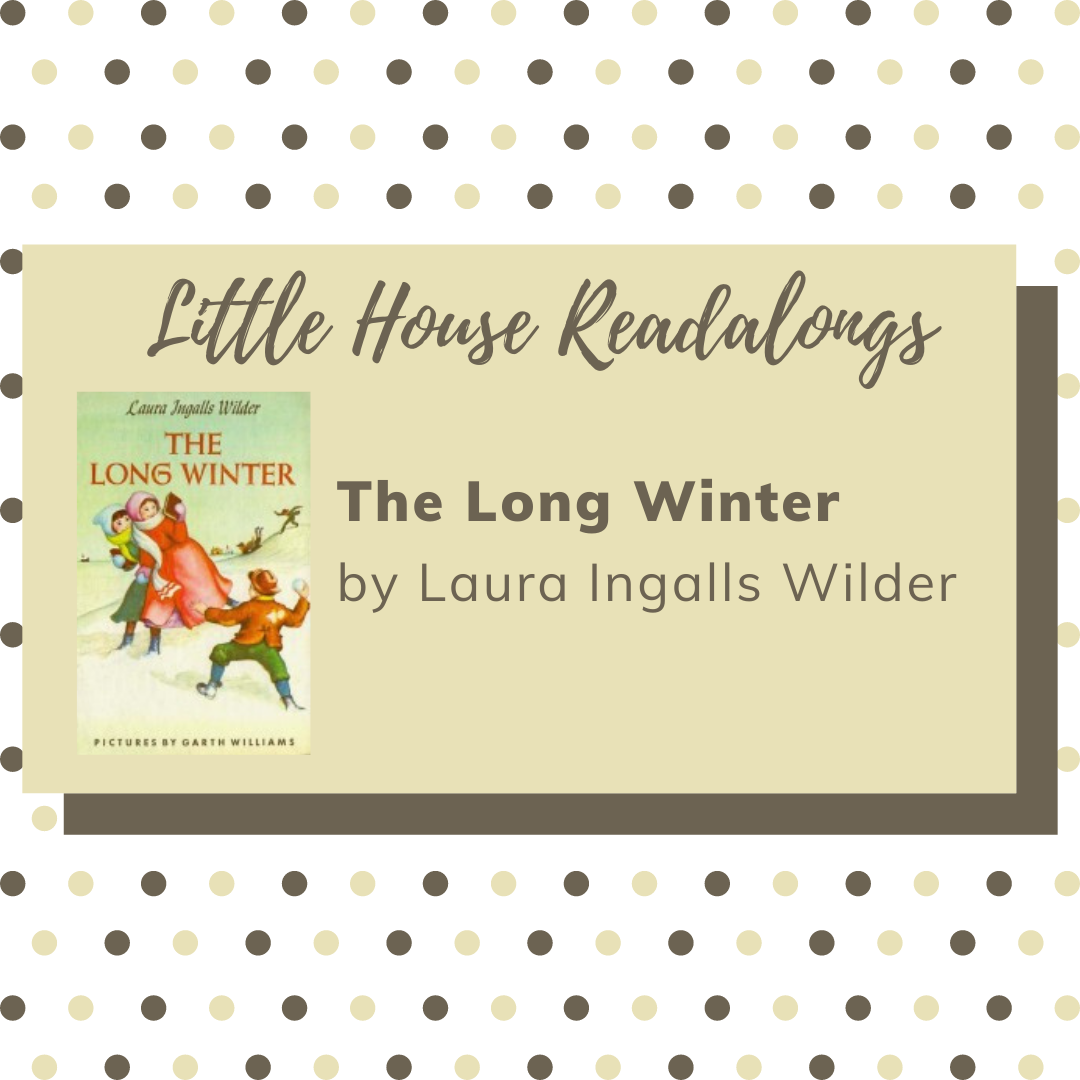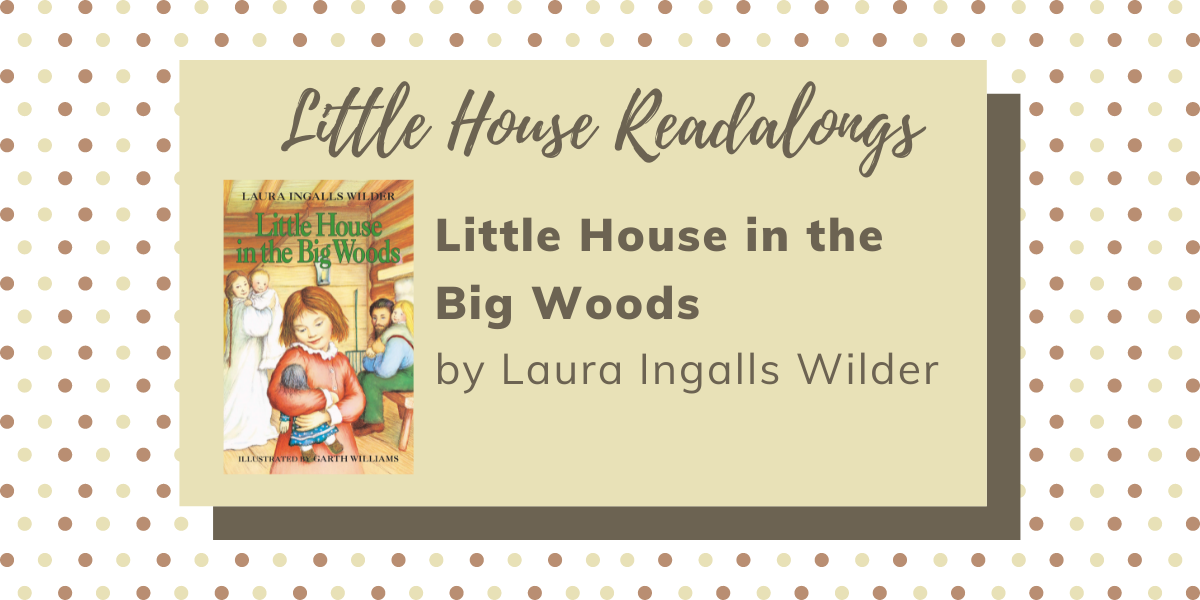
By now the blizzards are coming to life in Laura’s dreams as monsters, as she sleeps to the sound of the ice-sand scouring the roof. That scouring noise of the blizzards—a recurring description throughout the book—has always struck me as an unforgettable detail: it’s a sound that I imagine is practically foreign to us now that we live in more insulated homes.
Anyway, things are grim. Have the past few chapter summaries been saying that, too? Well, the grimness has progressed: the roof-nails have clumps of frost on them now; Laura and Pa’s hands are chapped and cut from twisting the hay sticks, and the rough hay has worn away their coats in the places where they held the bundles in place to twist them. For breakfast the Ingallses eat the brown bread dipped in tea, and for dinner they have potatoes, which they divide carefully, letting Pa have the extra one to keep up his strength.
If only it had been that fair in real life: remember that recent post about that other family who lived with the Ingalls family during the Long Winter? Remember how George Masters was kind of a jerk? Yeah, he totally hogged the potatoes. In her unpublished “Pioneer Girl” manuscript, Laura writes that as the potato supply dwindled, George would help himself to them first (even though he wasn’t doing any chores because he considered himself a paying boarder). Reportedly he’d scarf them so fast he’d burn his mouth and then exclaim, “Potatoes do hold the heat!” a phrase that eventually became an in-joke in the Ingalls family denoting selfishness. You really can’t blame Laura for writing him out of The Long Winter and rationing the fictional potatoes to favor Pa.
During the day, Ma rallies the girls by encouraging them to recite speeches and verses from the Independent Fifth Reader (thank goodness they have something else besides Millbank, though I suspect Laura can recite that book, too), and Pa hauls loads of hay. Then one day comes a “still morning” when Laura comes downstairs and Pa shows her the tunnel of snow he’s dug from the lean-to door to the stable.
That’s right, folks: the house is buried in the snow. Laura runs upstairs and looks out the window and sees Main Street at eye level, and watches the hooves of the Wilder boys’ horses as they trot by. As a kid, this part was amazing to me—perhaps even more so because the Blizzard of ’79 in Chicago was a recent memory, and while that winter hadn’t produced snow that was deep enough to bury the first floor of a house, it helped me understand that such things were possible. (How did the children of De Smet resist going sledding off their own rooftops? Oh, I guess they probably couldn’t get outside.)
For once, the snow and the cold are respites: the kitchen is insulated by the deep snowdrifts, and the cold holds the tunnel in place. The wind doesn’t blow, and for two days everything feels strangely quiet.
Then another storm sets in, and both Pa and Ma lose it for a moment—Pa curses the “gosh dang blizzard,” which “only lets go long enough to spit on its hands,” and Ma snaps back at him for swearing.
More coping and more bibilotherapy. This time Pa reads aloud from big green book of animals by the light of the button lamp. But Laura can’t quite escape into the words this time, because the relentless winds and the numbing routines are taking their toll on her. Suddenly she interrupts Pa’s reading and asks him to play the fiddle. Good idea!
Oh, but maybe it isn’t. The fiddle is brought out, and Pa attempts a few bars of “Bonnie Doon,” but his playing is off—his fingers, he says, are too stiff and thick from the cold to play properly. It’s one of the very lowest points of the family’s endurance—the music is gone, Pa is embarrassed he can’t play, and Laura feels awful for asking him to play. At least there is wheat to grind—as wearying as the routine is, the preparation of the daily bread gives the family something to do. Pa goes out to do his chores (yet again), and Ma sits by the stove and sings a hymn to the girls.


Comments7
A little off-topic, but how do you all have access to the unpublished Pioneer Girl? (And more to the point, how can I?)
Back on topic, this is the only time in the books that Pa can’t play the fiddle and it has always been the most depressing moment for me – even more than Mary’s blindness. It was the point that, when I read this book the first time (oh so many years ago) that it fully hit me how cold, dark and awful that winter must have been.
You can get a photcopied manuscript of “Pioneer Girl” from the Hoover Library, though the copy fees are pretty expensive! Most of the biographies quote material from “Pioneer Girl” and the Donald Zochert bio, Laura uses it pretty extensively, so much that by the time I finally read the manuscript I was already familiar with most of the important parts.
I remember commenting about the snow tunnel to my Dad when I was younger. He pointed out how cold the house must have been that the snow at 32 degrees helped to warm it up!
I agree that Pa not being able to play the fiddle is the low point of the series. Without the music, what is to keep them going?
On an upnote, anyone else notice that Laura remembers recognizing that Wilder boy’s horses’ feet? Those must have been a really impressive pair of horses!
It wasn’t that the snow warmed up the house at 32 degrees, but that it insulated it so that the heat generated by the stove actually stayed in the house.
What I wondered was why they didn’t die from carbon monoxide.
Wendy– thanks so much for your link to beyondlittlehouse! I am a big “Little House” fan, and I am enjoying this reading of “The Long Winter” so much! I actually re-read “The Long Winter” when I was on bed rest for my twin pregnancy– I gave birth to twin girls, Maia and Sarah, on 12/7/09– but I am loving the thoughtful re-caps and everyone’s comments. You even inspired me to order “The Little House Cookbook!”
I can’t wait to share all things “Little House” with my girls. And I can’t wait to read your upcoming book! Thanks again.
Love, Laura
I would like to know the age of Laura Ingalls Wilder when she wrote these memoirs. She may have perceived other people as snobs and jerks but history has a way of showing otherwise.
George Masters is my great, great grandfather. The small child he and Maggie or Margaret had was my great grandfather Arthur Kingsbury (named for the county) Masters. His one son, my grandfather, started a chain of ministers and pastors that extends for 4 generations including myself and my sons.
Here is a link to an article about George Masters
http://files.usgwarchives.net/sd/biography/doane2/masters.txt
The exhaust from the stove went up the stovepipe and out the roof. So, no carbon monoxide build up inside – at least, not much. The upstairs window had a view on the street, and there was still lots (!) of ventilation through the upstairs walls.
Comments are closed.